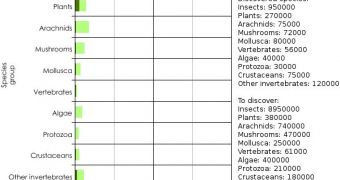Evolutionary biologists have recently proposed that, in the case of some species, evolution may actually be taking place in sudden “bursts,” rather than through the continuous accumulation of small differences. The latter approach was held to be the norm among all living things until recently. It was believed that mutations passed on from generation to generation were the basis of evolution, but a new body of pieces of evidence is now showing that evolution can “jump” forward as well, following, for instance, a single, dramatic event affecting members of a species, Nature News reports.
The new investigation was conducted on several thousand species and their evolutionary, family trees, experts say. It directly contradicts the “Red Queen” hypothesis, thus named after the character from Lewis Carroll's books Through the Looking-Glass, and What Alice Found There. The idea suggests that species are constantly changing in small increments so as to keep up with the changes in their environment. At one point, a group of animals in a species becomes so different from other animals in the same species, that the two can no longer cross-breed and reproduce successfully. When this happens, a new species appears.
In a new scientific paper, published in the December 9 issue of the top journal Nature, scientists from the UK, led by University of Reading expert Mark Pagel, say that a comparative analysis of four models of speciation (the appearance and development of a new species) lends little credence to the Red Queen model. The scientists looked at the evolution of bumblebees, turtles, foxes and roses, among 100 other species of animals and plants. “What we've shown is that speciation is about happy accidents – rare events that happen in the environment that cause a species to speciate,” Pagel says.
It was determined that 80 percent of the analyzed tree species tended to evolve following a single, shocking event, based on the knowledge gathered from studying their evolutionary trees. The Red Queen hypothesis, the group says, is apparently leaping ahead from time to time, then stopping for a while before repeating the sequence. “It really goes against the grain because most of us have this Darwinian view of speciation. What we're saying is that to think about natural selection as the cause of speciation is perhaps wrong,” Pagel says.
Speaking about the not-too-warm welcome that the scientific community held in store for the new theory, Pagel adds that, “We think people will come around because it will start to unravel some mysteries about speciation.”

 14 DAY TRIAL //
14 DAY TRIAL //